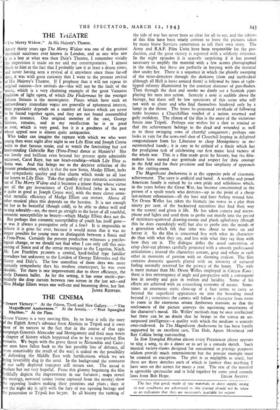THE TriEATRE
The Merry Widow." At His Majesty's Theatre.
I.
Aaciu-r thirty years ago The Merry Widow was one of the greatest theatrical successes ever known in London, and as one who saw it as a boy at what was then Daly's Theatre, I remember vividly the impression it made on me and my contemporaries. I almost blush to hint at the fact that I probably saw it at least a dozen tunes, and never having seen a revival of it anywhere since those far-off 1 days, it was with great curiosity that I went to the present revival at His Majesty's Theatre. If I prophesy that it will not repeat its original success—few revivals do—this will not be the fault of the music, which is a very charming example of the great Viennese tradition of light opera, of which Die Fledermaus by the younger Johann Strauss is the masterpiece. Pieces which have such an extraordinary immediate vogue are generally of ephemeral interest, their popularity depends on a number of factors which are never to be found together again, and they are not found reassembled I in this instance. One original member of the cast, George Graves, remains, and in my recollection he is as good s as ever, which is very good, but it is a goodness of the past whose appeal now is almost quite antiquarian.
Who today can imagine the rapture with which we who were young then went night after night to sec Lily Elsie and Joseph Coyne waltz to that famous strain, and to watch the fascinating but not heart-rending Gabrielle Ray (Frou-Frou) dance at Maxim's? She was lovely and brilliant even beyond her present quite admirable successor, Carol Raye, but not heart-rending—which Lily Elsie as Sonia was. And this brings me to the decisive criticism of the present production, which is that the new Sonia, Madge Elliott, lacks 0 that sympathetic quality and that charm which made us all lose our hearts to Lily Elsie. Take that quality of true romantic sentiment out of The Merry Widow and it becomes a jejune thing whose virtue not all the gay insouciance of Cyril Ritchard (who in his way is quite as good as Joseph Coyne was), with the mere clever some- what metallic efficiency of Madge Elliott can restore. Above all other musical plays this depends on the heroine. It is not enough for her to be beautiful (though cold), to be able to dance well and to sing tolerably—no, she must go straight to the heart of all youthful,
romantic susceptibility to beauty—which Madge Elliott does not do.
But perhaps that romantic susceptibility of youth has itself gone— or was it always a prerogative only of a few? It is impossible to e believe it is gone for ever, because it would mean that it was no s longer possible for young men to distinguish between a Sonia and a Frou-Frou. Certainly the present production witnesses a psycho- logical change, or we should not find what I can only call this mis- casting of Sonia and of the comic messenger to the Legation, Nisch. Mr. Leo Franklyn pr...-sents a cynical, hard-boiled type familiar nowadays but unknown to the London of George Edwardes and the Gaiety and Daly's. The -low comedian of those days was more humanly sympathetic than his modern counterpart, he was even e likeable. Yet there is one improvement due to sheer efficiency, the
e vely Damora ballet. As for the setting, it has some merit—par-
n ncularly the drop curtain between two scenes in the last act—and
is Madge Elliott wears one well-cut and becoming dress, her fast.
JAMES REDFERN.


























 Previous page
Previous page